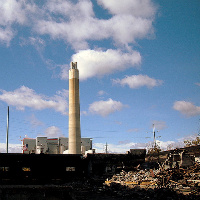Opponents ’still holding their breath’
 Environmentalists who have campaigned against Detroit’s continued use of the nation’s largest incinerator don’t know whether to celebrate or not.
Environmentalists who have campaigned against Detroit’s continued use of the nation’s largest incinerator don’t know whether to celebrate or not.
They did win a victory of sorts. The city recently said it will move toward landfilling its trash.
But if owners of the incinerator can match or beat bids from landfill operators, the city might still have to use the incinerator — and that possibility has environmentalists worried.
Community activist Dan Sordyl, who took two months off his day job to fight the Detroit trash incinerator, gave Michigan Messenger an update:
“The current status is that the mayor [Kwame Kilpatrick] had sided with the people. I feel like our voices were heard. He now says he will not renew any contract [with the incinerator owners]. We have about 11 1/2 months left before the incinerator stops burning trash.”
But here’s the catch:
“It is written in our contracts that the owners have the right to match landfill prices and the city has to go with the lowest bidder whether that is the landfill of the incinerator. We have the cheapest landfill prices in the country — about $17 a ton. The experts have done the math and there’s no way [the incinerator owners are] going to be profitable and match this part. But everyone is still holding their breath. There’s a bright light at the end of the tunnel but we’re still in the tunnel.”
A clause in the contract between the Greater Detroit Resource Recovery Authority and the city of Detroit would allow Detroit’s solid waste to continue being burned at the incinerator if it can do so for less than a landfill offers.
Owners of the trash incinerator that has burned all of Detroit’s trash since it opened in 1989 were struck with a blow when the City Council decided in June not to renew the contract that bound it to the city.
Detroit constructed the incinerator in 1984, but then sold it in 1991 to private companies in order to patch a gap in the city budget. Since then Detroiters have been paying up to $172 a ton for trash disposal, as opposed to the $18-a-ton cost of landfills. That’s on top of the rotting stench and harmful chemicals — including methane, dioxin and carbon dioxide — that the incinerator spews into the air. Officials say the trash burner will be paid off a year from now, the city having spent about $1.2 billion on it.
The recovery authority is taking bids from landfills, but because of the large tipping fees they get from burning trash, they may try to beat those bids if possible, a community organizer from the ecology center said.
The new solid waste disposal model that is under consideration by the City Council would call for the minimal landfilling once used with a curbside recycling program. Detroit is the only major U.S. city without curbside recycling. Detroit Deputy Mayor Anthony Adams, as chair of the recovery authority, has used fluctuating landfill prices as a reason to keep the incinerator in business, saying that with rising gas prices affecting the cost of fuel for garbage trucks, it might be a risky venture to depend on landfills.
But most opponents of the incinerator say that competition between landfill companies is enough to counter rising fuel prices and keep landfilling prices low enough to take the incinerator out of the picture.
Recovery authority representatives recently told the City Council that if they operated the incinerator beyond 2009, they could do it at an all-time low price of $20 a ton and beat all other landfill offers. However, they have not placed a bid yet, and the lowest landfill bid has been placed at under $20 a ton. The deadline for the incinerator to place its bid is Jan. 1, 2009.




